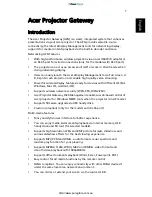
Gy Interface Support
Features and Terminology ▀
Cisco ASR 5x00 Packet Data Network Gateway Administration Guide ▄
341
Debit Units Response; sent from OCS to CTF: The OCS replies with a Debit Units Response, which informs the
CTF of the number of units granted as a result of the Debit Units Request. This includes the case where the
number of units granted indicates the permission to render the requested service. For refund purpose, the OCS
replies with a Debit Units Response.
Reserve Units Request; sent from CTF to OCS: Request to reserve a number of units for the service to be
provided by an CTF. In case of centralised unit determination, the CTF specifies a service identifier in the
Reserve Unit Request, and the OCS determines the number of units requested. In case of decentralised unit
determination, the number of units requested is specified by the CTF.
Reserve Units Response; sent from OCS to CTF: Response from the OCS which informs the CTF of the number
of units that were reserved as a result of the “Reserve Units Request”.
Session Charging with Unit Reservation (SCUR) use both the “Debit Units” and “Reserve Units” operations. SCUR
uses the Session Based Credit Control procedure specified in RFC 4006. In session charging with unit reservation, when
the “Debit Units” and “Reserve Units” operations are both needed, they are combined in one message.
Important:
Cost-Information, Remaining-Balance, and Low-Balance-Indication AVPs are not supported.
The consumed units are deducted from the subscriber's account after service delivery. Thus, the reserved and consumed
units are not necessarily the same. Using this operation, it is also possible for the CTF to modify the current reservation,
including the return of previously reserved units.
Re-authorization
The server may specify an idle timeout associated with a granted quota. Alternatively, the client may have a
configurable default value. The expiry of that timer triggers a re-authorization request.
Mid-session service events (re-authorisation triggers) may affect the rating of the current service usage. The server may
instruct the credit control client to re-authorize the quota upon a number of different session related triggers that can
affect the rating conditions.
When a re-authorization is trigger, the client reports quota usage. The reason for the quota being reported is notified to
the server.
Threshold based Re-authorization Triggers
The server may optionally include an indication to the client of the remaining quota threshold that triggers a quota re-
authorization.
Termination Action
The server may specify to the client the behavior on consumption of the final granted units; this is known as termination
action.
Diameter Base Protocol
The Diameter Base Protocol maintains the underlying connection between the Diameter Client and the Diameter Server.
The connection between the client and server is TCP based. There are a series of message exchanges to check the status
of the connection and the capabilities.
















































